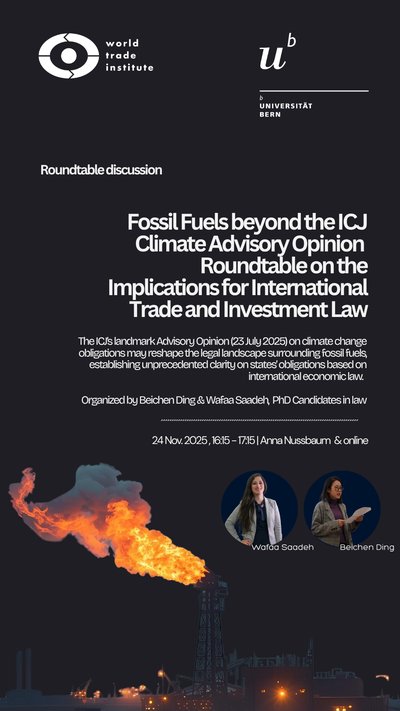Conferences / Workshops
24 Nov 2025
,
16:15
-
17:15
| Download
Calendar Event (ICS)
Anna Nussbaum Auditorium and online,
Hallerstrasse 6, Bern, Switzerland
Hosted by:
Ding, Beichen
,
Saadeh, Wafaa
Fossil Fuels beyond the ICJ Climate Advisory Opinion Roundtable on the Implications for International Trade and Investment Law
The International Court of Justice’s landmark Advisory Opinion on Climate Change Obligations (23 July 2025) represents a decisive step in clarifying states’ legal responsibilities regarding fossil fuel production and use. For the first time, the Court articulated that states’ obligations under international law extend to the “ongoing production, licensing and subsidizing of fossil fuels” (para. 94). This pronouncement bridges environmental and economic governance, making clear that fossil fuel-related state conduct is subject to climate law scrutiny.
The Court emphasized that attribution of acts or omissions—for example, failures to regulate or excessive support for fossil fuels—must be assessed under international law criteria. It found that a failure to take appropriate measures to protect the climate system from excessive greenhouse gas (GHG) emissions may constitute an internationally wrongful act (paras. 426–427).
Most significantly, the Court confirmed that certain climate obligations, including the customary law duty to prevent significant transboundary harm, are obligations erga omnes—owed to the international community as a whole (para. 440). This elevates climate protection from a matter of policy discretion to a legal duty with universal scope, reshaping expectations for compliance and accountability.
Together, these findings reverberate across international economic law, particularly in the fields of trade and investment, where fossil fuels remain deeply embedded. The Opinion opens new legal and policy questions about the compatibility of states’ economic measures with their climate obligations, and the potential reconfiguration of international economic regimes in light of this emerging legal clarity.
Discussion framework on legal perspectives:
- Introduction of the opinion and its relation to international economic law
- Fossil fuels and trade: Beichen Ding
What are the states’ climate obligations in the trade context? For instance, can states impose climate-motivated import tariffs on fossil fuels as a tool for fulfilling their ICJ-mandated obligations? Do climate obligations under the ICJ opinion affect the policy space for fossil fuel import tariffs under GATT Articles III and states’ continued use of fossil fuel subsidies?
- Investment law and fossil fuels: Wafaa Saadeh
The implications of the ICJ’s Opinion for investment law: how does the ICJ opinion reshape the balance between investor protection and states’ climate duties? What are the implications for legitimate investor expectations, regulatory chill, treaty interpretation and reform?
- Q/A
- Conclusions: Where do we go from here?


